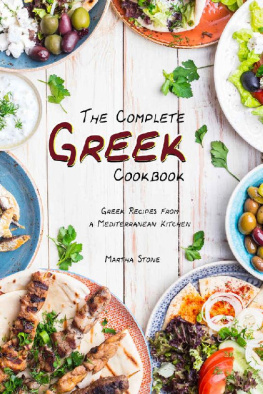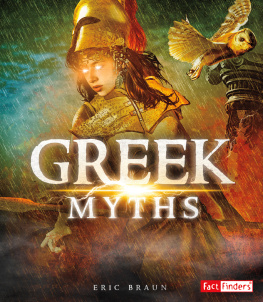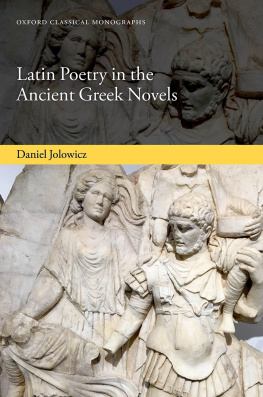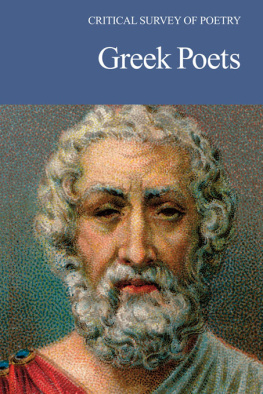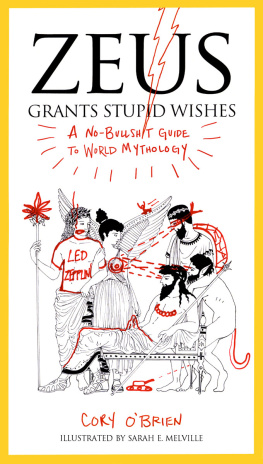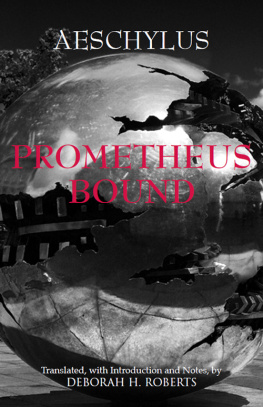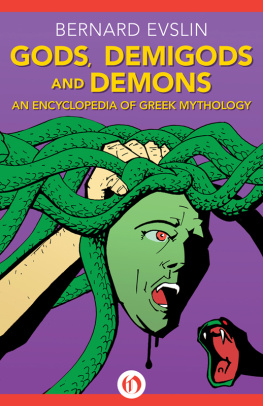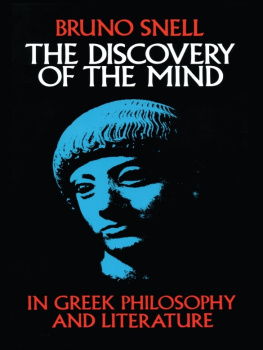Zeus (Greek deity) in literature. - Challenges to the Power of Zeus in Early Greek Poetry
Here you can read online Zeus (Greek deity) in literature. - Challenges to the Power of Zeus in Early Greek Poetry full text of the book (entire story) in english for free. Download pdf and epub, get meaning, cover and reviews about this ebook. City: London, year: 2013, publisher: Bloomsbury Academic, genre: Children. Description of the work, (preface) as well as reviews are available. Best literature library LitArk.com created for fans of good reading and offers a wide selection of genres:
Romance novel
Science fiction
Adventure
Detective
Science
History
Home and family
Prose
Art
Politics
Computer
Non-fiction
Religion
Business
Children
Humor
Choose a favorite category and find really read worthwhile books. Enjoy immersion in the world of imagination, feel the emotions of the characters or learn something new for yourself, make an fascinating discovery.

- Book:Challenges to the Power of Zeus in Early Greek Poetry
- Author:
- Publisher:Bloomsbury Academic
- Genre:
- Year:2013
- City:London
- Rating:5 / 5
- Favourites:Add to favourites
- Your mark:
- 100
- 1
- 2
- 3
- 4
- 5
Challenges to the Power of Zeus in Early Greek Poetry: summary, description and annotation
We offer to read an annotation, description, summary or preface (depends on what the author of the book "Challenges to the Power of Zeus in Early Greek Poetry" wrote himself). If you haven't found the necessary information about the book — write in the comments, we will try to find it.
Challenges to the Power of Zeus in Early Greek Poetry — read online for free the complete book (whole text) full work
Below is the text of the book, divided by pages. System saving the place of the last page read, allows you to conveniently read the book "Challenges to the Power of Zeus in Early Greek Poetry" online for free, without having to search again every time where you left off. Put a bookmark, and you can go to the page where you finished reading at any time.
Font size:
Interval:
Bookmark:
Challenges to the Power of Zeus
in Early Greek Poetry
TO THE
POWER OF ZEUS
IN
EARLY GREEK POETRY
Noriko Yasumura

Bloomsbury Academic
An imprint of Bloomsbury Publishing Plc
50 Bedford Square | 1385 Broadway |
London | New York |
WC1B 3DP | NY 10018 |
UK | USA |
www.bloomsbury.com
First published in 2011 by Bristol Classical Press
an imprint of Bloomsbury Academic
Reprinted by Bloomsbury Academic 2013
Noriko Yasumura, 2011
Noriko Yasumura has asserted their right under the Copyright,
Designs and Patents Act, 1988, to be identified as
Author of this work.
All rights reserved. No part of this publication may be reproduced or
transmitted in any form or by any means, electronic or mechanical,
including photocopying, recording, or any information storage or
retrieval system, without prior permission in writing
from the publishers.
No responsibility for loss caused to any individual or organization acting
on or refraining from action as a result of the material in this
publication can be accepted by Bloomsbury or the author.
British Library Cataloguing-in-Publication Data
A catalogue record for this book is available from the British Library.
eISBN-13: 978-1-4725-1968-9
Library of Congress Cataloging-in-Publication Data
A catalog record for this book is available from the Library of Congress.
It was a long time ago indeed, as long as thirty years ago that the idea for this book first came to my mind. In 1974-5 I was given the chance to study at Cambridge as a British Council Scholar under the supervision of the late Dr John Chadwick. Under his guidance I studied the Linear B tablets and found myself particularly attracted by the religious tablets from Pylos. They seemed to show that Zeus was just an ordinary god in those days a god, no doubt, but one of no specific significance. This revelation was a great surprise: with my ideas so informed by Homer and Hesiod, I had never doubted Zeus supremacy in the Greek mythological universe. I recognised now that the characterisation of Zeus had been transformed by the beginning of the Archaic period, and I became curious to know more about the strategies and processes underlying Zeus progression to sovereignty. From this tiny germ of curiosity arose the idea for this book.
I was able to return to this theme and build on my preliminary ideas when I undertook a PhD at University College London under the supervision of Professor Richard Janko. He greatly encouraged my work and this book has its basis in this PhD dissertation, submitted in 2004.
I returned to Japan in 1998, having obtained a professorship at Kanazawa University. As I read Classical literature with my students, I found myself involved in many exciting and enjoyable discussions about my work. Moved by these dialogues, directly and indirectly, I wrote the article on Prometheus which forms the basis of in this book.
One fascination has remained constant throughout this long journey: Homer. Whenever I read the Homeric epics, I find something new. I find myself deeply impressed by the profundity of thought, richness of artistic technique, and humour of the storytelling in these poems. Although the history of Homeric studies dates back to the Hellenistic Age, and unimaginable numbers of works have been published on the poems, I believe that it is still possible to tease out some hitherto hidden threads and reveal some obscured facets of the Homeric tradition. That is the aim of this book.
On various occasions in my life some delightful, some sad and some inspiring I have recollected and gained comfort from the Homeric poems. For example, admiring a beautiful snowfall in Kanazawa, I recalled the simile of the snowflakes used of the eloquence of Odysseus (Il. 3.222); when sad, I was reminded of the story of the two jars on Zeus floor (Il. 24.527-33), or of Achilles memorable resolve when contemplating his death, that even mighty Heracles could not escape death (Il. 18.117). I have been encouraged, educated and restored by the Homeric verses, and it is as though the two epics have become my good friends. It has been my greatest pleasure to study them and I truly believe, as Xenophon so properly writes (Smp. 4.6), that everything relating to human life is in Homer.
I am often asked how Asian people could ever understand Classical Greek thought. But I have never doubted that we too can appreciate the profound ideas transmitted to us from the ancient Greek world. As Herodotus points out about those older times, interchange between East and West was constant and ongoing. Thus Greek civilisation has not been alien to Oriental people, nor does the Western world have a monopoly on its understanding. These ideas possess a value which is universal; and we are all part of this one world. Truly, the radiance of Greek thought should be shared and perceived by us all.

I could not have completed this book without the generous support of a large number of people who spared me their time and offered me invaluable insights and advice. I wish first to express my great gratitude to Professor Richard Janko, my supervisor at the University of London. I am indebted beyond measure to him for the time he has so freely offered in reading and commenting on my work. I will always be grateful for his support, innumerable useful suggestions and encouragement.
I am particularly grateful to Professor Pat Easterling, who kept me on the right track. From the time I first met her in Cambridge in 1994, her exceptional intellectual guidance has been as unfailing as the strength of her moral support. It has been my privilege to know her and enjoy all of the benefits of her generous nature. When I found the following verse in the fragments of Diphilus,

How blessed it is to have intelligence in noble character (Diph. fr. 113 K.-A.)
I thought that this entirely encapsulated Pats finest qualities. I hope to dedicate this verse to her.
I would like to express my gratitude to my professors who taught me at the International Christian University in Tokyo and the Graduate School of Kyoto University for their guidance of my education when I was a student. The instruction which I received from them provided a firm foundation for my further studies. Without the enthusiasm of these teachers, I could never have dreamed of a career in the Classics. I owe a great debt to their thorough training and will always be grateful for their personal support.
Special thanks are due to my many friends who have always supported me greatly. In particular I wish to record my thanks to the late Professor Colin Austin who kindly read my manuscript and corrected my English translations of the ancient texts. I deeply regret his too early death. Professor Elizabeth Craik, Dr Natalie Tchernetska, Dr Naoko Yamagata and Dr Antonia Ruppel kindly read my manuscript and gave me many useful comments. I am grateful to them for their cordial friendship. I owe a debt of gratitude to Dr Akiko Tomatsuri for the preparation of the indexes. I have been greatly assisted by her diligence. Above all, I would like to express my deep gratitude to Dr Victoria Jennings and Dr Andrea Katsaros, who read my manuscript carefully, tirelessly corrected my English, and offered countless valuable suggestions. Their patience and warm support were indispensable for the completion of this book. I must also thank Ms Deborah Blake, my editor, for her great support. Since the time when the first contract for the publication of this book was made with Duckworth, she has continued to encourage me with kindness and tolerance. Any remaining errors are, of course, my own. Finally, I would like to thank my family for their unlimited empathy and patience. I am especially grateful to my husband, who is now seriously ill, for his profound understanding.
Next pageFont size:
Interval:
Bookmark:
Similar books «Challenges to the Power of Zeus in Early Greek Poetry»
Look at similar books to Challenges to the Power of Zeus in Early Greek Poetry. We have selected literature similar in name and meaning in the hope of providing readers with more options to find new, interesting, not yet read works.
Discussion, reviews of the book Challenges to the Power of Zeus in Early Greek Poetry and just readers' own opinions. Leave your comments, write what you think about the work, its meaning or the main characters. Specify what exactly you liked and what you didn't like, and why you think so.

